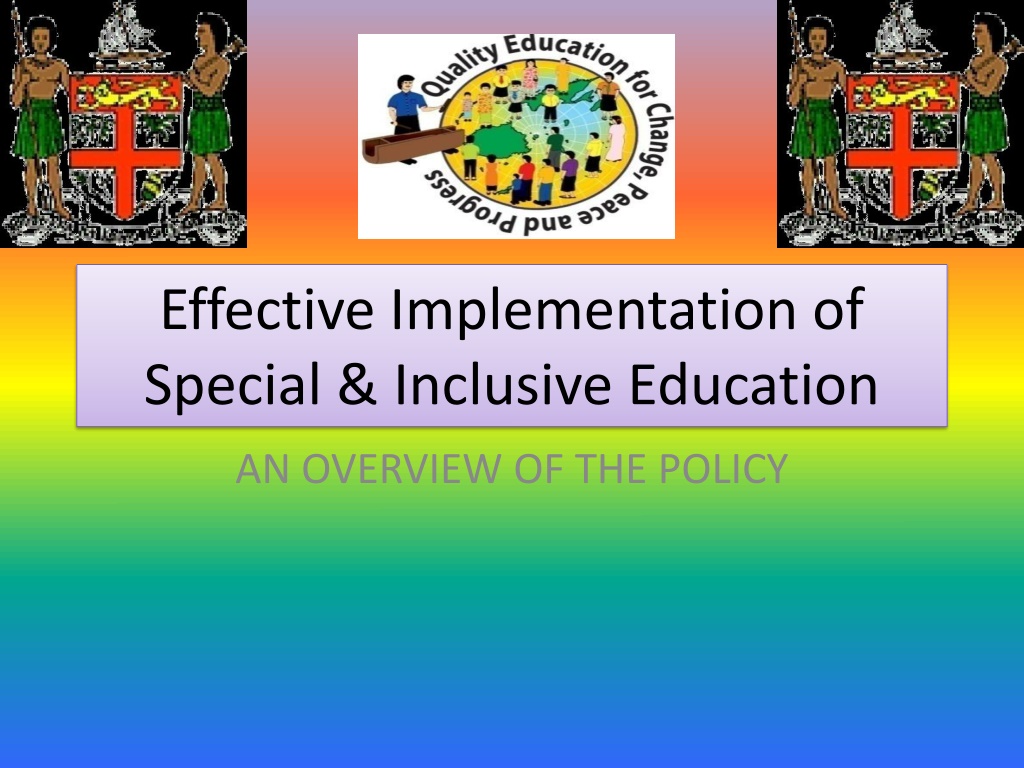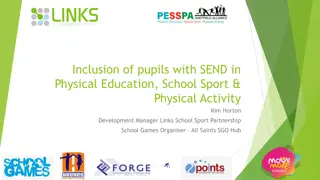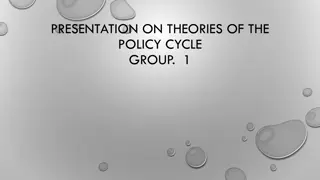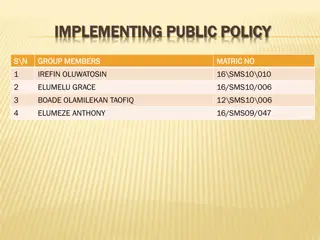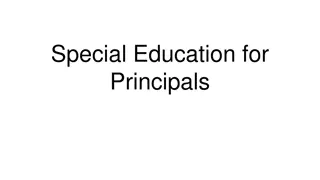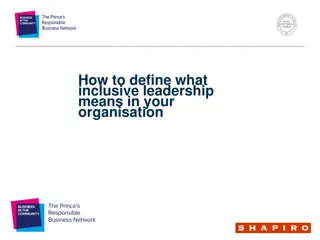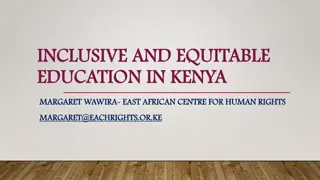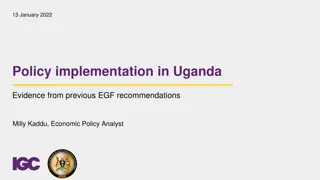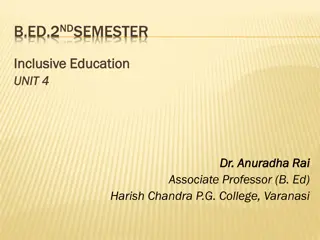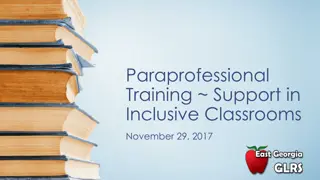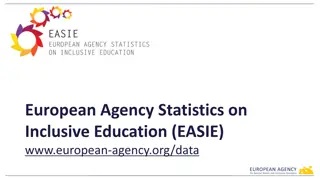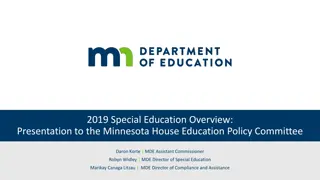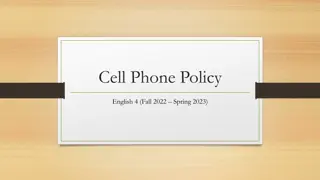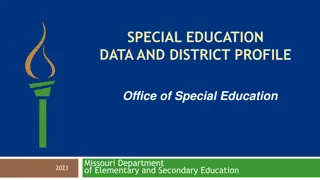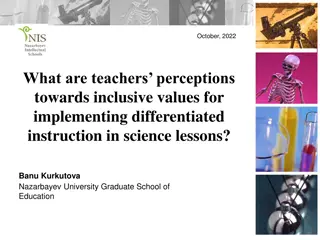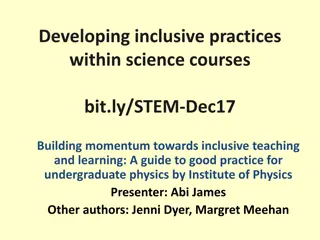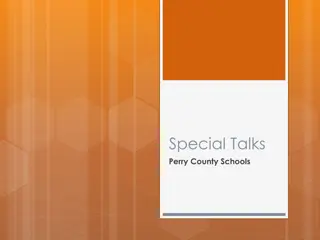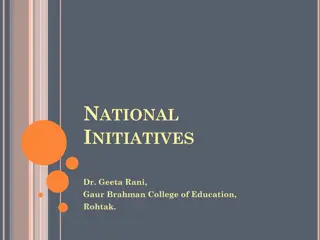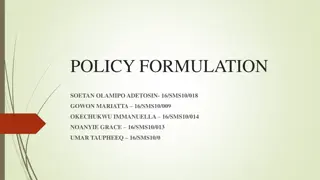Effective Implementation of Special & Inclusive Education Policy Overview
Providing an overview of the effective implementation of special and inclusive education policy, this content discusses inclusive education, special education, traditional education systems, historical dissatisfaction with dual systems, and the importance of the policy for children with special needs to access quality education. It also covers the global inclusive model and references to education rights in the constitution.
Download Presentation

Please find below an Image/Link to download the presentation.
The content on the website is provided AS IS for your information and personal use only. It may not be sold, licensed, or shared on other websites without obtaining consent from the author. Download presentation by click this link. If you encounter any issues during the download, it is possible that the publisher has removed the file from their server.
E N D
Presentation Transcript
Effective Implementation of Special & Inclusive Education AN OVERVIEW OF THE POLICY
ENDORSEMENT APPROVED BY THE HONOURABLE MINISTER FOR EDUCATION,NATIONAL HERITAGE,CULTURE, AND ARTS, AMBASSADOR FILIPE BOLE 18TH NOVEMBER 2013
Definitions Inclusive Education: the way in which children with special needs are placed in general education classrooms Special Education or Special Needs Education:- is the education of students with special needs in a way that addresses the student s individual differences and needs.
TRADITIONALLY: TWO EDUCATION SYSTEMS Regular/General/Mainstream Schools: offer curriculum designed/developed by MoE, states, districts. External exams set by state, MoE, etc. Special Schools: offer educational services for students with diverse educational needs. Focus on individualisation: re:- IEP s aids/equipment/strategies/interventions
1960s: DISSATISFACTION WITH DUAL EDUCATION SYSTEM Advocates: One education system should cater for all A dual system is inefficient Push from exclusion to inclusion will be beneficial to all students Other views: Saving money by having one system is the motive for inclusion
Also in the 60s Catholic schools enroll students with special needs 1. Saint Joseph Secondary 2. Marist Brothers High Schools Were the first two schools that took in students with special needs
WHY THE POLICY??? So that children with special needs can access quality education in all schools and at all levels.
Global Inclusive Model NATION COMMUNITY (Schools, Church) HOME (Parents, Siblings) SPECIAL NEEDS CHILD
The Mention of it in the Constitution ARTICLE 31- THE RIGHT TO Education ECE, Primary, Secondary & Further education ARTICLE 42: (1)THE RIGHTS OF PERSONS WITH DISABILITIES a. To reasonable access to all places. b. To use appropriate means of communication (sign language or braille) c. To access materials and devices relating to their disability (2) Right to reasonable adaptations to buildings, infrastructures vehicles etc. [ Constitution of the Republic of Fiji, 2013]
TEN Relevant Legislations Biwako Document (2003-2012) Fiji Human Rights commission Act (1999) FNCDP Act of 1994
TEN Relevant Legislations MoENHCA Co-operate Plan (2012) National Policy on Persons living with Disabilities (2008-2018) UN Conventions on the Rights of People with Disabilities Article 24
FUNDAMENTAL PRINCIPLES OF INCLUSION All children Belong All children have a right to learn All children have a right to live and be well supported Inclusion All children have right to fully participate
Statement of Principles People with disabilities in Fiji have the same fundamental rights, freedom and responsibilities as their non-disabled peers. All children have the right to the most appropriate educational programs available to meet their individual needs. Students with special needs require specialized support services to provide them with opportunities to achieve their maximum potential and to become contributing members of society in a dignified and a meaningful way.
Statement of Principle( contd) The Ministry of Education in Fiji is committed to providing Special/Inclusive Education Services to meet the needs of all special needs students in active partnership with parents and the community.
HOW ????? Children with special needs attend the school closest to their homes Family members are carers for their children Parents are actively involved in supporting the school. Students with special needs draw donors to the school
Inclusive Education Policy Moreover all children should be given the opportunity to learn together, wherever possible regardless of difficulties, disabilities or differences. (Policy Objective- IE,MoE)
Mobilising Inclusive Education Up Skilling existing Teachers Internal Training for Education Officers Target teacher training institutions for the inclusion of special & inclusive education programs Increase staffing & resources in special schools Secure volunteers in the field of physiotherapy, audiologist, speech pathologist..etc..
Policy Procedures To be implemented/strengthened No Strategies Key Role Player 1. Assessment - To determine the correct placement of children SIEU, SP.Schools, SENCO s 2. Placement-Diagnosis of Disability/ Confirming the disability MoH-Specialist Volunteers 3. Curriculum-Translation of curriculum into Sign Language & Braille SIEU, Curriculum Review Group 4. Training of Teachers SIEU, AQEP, SENCO s 5. Appropriate Financial Support to inclusive/mainstream schools MOENHCA 6. Raising Awareness for Inclusion ,Support to Parents & the School Community Special Schools, DPO s, SENCO s
Policy Procedures To be implemented/strengthened No Strategies Key Role Player 1. Strengthening Teacher Education at Teacher Training Institutions FNU, CCTS, FC 2. Appropriate Teaching Staff made available District PEO s, PEOP, DPE 3. One Special Needs Officer per district PEOs 4. One Inclusive School per district PEOs 5. Integration & Inclusion Tertiary level SIEU,TVET,PSC 6. Review of Budget to Increase S.E grant SIEU
Integrated Cluster Approach Inclusive Mainstream School Inclusive Mainstream School SPECIAL SCHOOL Inclusive Mainstream School Inclusive Mainstream School
Example: Macuata/Bua District Labasa Primary School Saint Mary School LABASA SPECIAL SCHOOL Bethel Primary Holy Family Primary
6.10.3 Each Child will receive a disability grant per year
6.10.3 Every inclusive School will need teacher aide support
Degree of Disability Mild Ratio 1:2 Moderate Ratio 1: 4 Severe Ratio 1: 6
Specialist Support Audiologist Braille & De-Braille Readers & Writers Speech Pathologist Occupational Therapist Educational Psychologist Physiotherapist Counsellors O&M Trainers, etc.
IE may take a while . A long journey begins with a single step
